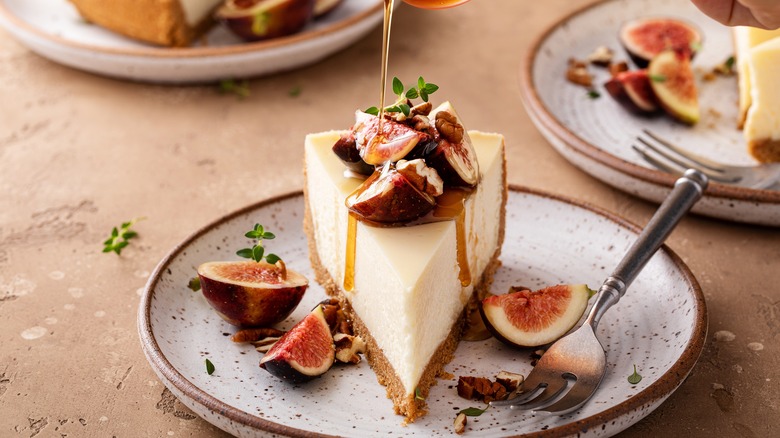The Liqueur That Can Jazz Up Any Sweet Dish
Whether it be chocolatey or fruity, the prevailing flavor in most desserts is usually one that's sweet. However it isn't uncommon to come across a dessert where you can also detect a hint of alcohol. Fruit cakes, for example, are often soaked in spiced rum to complement notes of allspice, ginger, and cinnamon, and there are plenty of other desserts that call for sweet liqueurs, like limoncello bread pudding. If there's caramel present, bourbon is a popular go-to, and in mocha or coffee-centric sweets like tiramisu, sometimes Baileys and Kahlua are used in place of espresso.
When you add alcohol to a dessert it doesn't only layer on more flavor, it also intensifies the ones that are present. That's because in concentrations of 1% or lower, alcohol acts as a natural flavor enhancer. The way it works in desserts is that the added alcohol binds with the fat and water molecules, and as a result, you perceive an enhanced taste and smell. This occurs with any type of alcohol, but there's actually one liqueur that pairs surprisingly well with sweets.
Amaretto isn't just for drinking
When most people enjoy amaretto, it's normally in the form of a cocktail. The liqueur tends to be paired with other alcohols like brandy, whiskey, gin, and vodka, as well as citrusy mixers like lemon juice and Sprite. But as versatile as it is in mixed drinks, amaretto is also a useful ingredient when it comes to dessert.
Because amaretto is widely known as an almond-flavored liqueur, you might assume it goes best with nutty desserts like pecan pie or any baked good that includes marzipan. In reality, you can use it as a substitute for vanilla extract or simply add it into cookies and cakes for an extra boost of flavor. It won't make your desserts taste overwhelmingly nutty, because contrary to popular belief, amaretto's distinct flavor doesn't come exclusively from almonds. It also comes from caramelized sugar, spices, and sometimes there are no almonds at all, but rather apricot or peach pits.
Why does amaretto pair well with desserts?
Like any other alcohol, amaretto is a natural flavor enhancer, but there's another reason it pairs particularly well with desserts: it's bitter. Though amaretto has sugar in it, the liqueur is actually more on the bitter side, in fact the word amaretto literally translates to 'little bitter' in Italian. While you can technically drink amaretto by itself, its bitterness is what makes it ideal for combining it with other flavors, whether that be in a cocktail or dessert.
Bitterness isn't exactly what you want to taste when you eat dessert, but you do want balance. That's why combos like dark chocolate with raspberries, or salted caramel work so well together. Amaretto in a dessert is no different — its unique bitter flavor counteracts the sweetness of a sugary dessert. The amount of amaretto you should use will depend on the recipe you're making, but if you're using it in place of vanilla extract, all you need to do is swap out an equal amount, and your dessert will have a perfectly balanced flavor.


